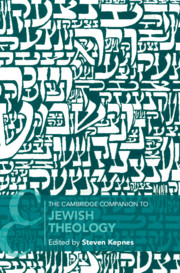Book contents
- The Cambridge Companion to JEWISH THEOLOGY
- cambridge companions to religion
- the cambridge companion to JEWISH THEOLOGY
- Copyright page
- Contents
- Notes on Contributors
- Acknowledgements
- 1 Introduction
- 2 What is Jewish Theology?
- Part I Biblical-Rabbinic
- Part II Medieval
- Part III Modern
- Part IV Contemporary Issues
- Part V Analytic Philosophy and Theology
- 16 Can There Be a Positive Theology?
- 17 Theological Realism and its Alternatives in Contemporary Jewish Theology
- 18 A Defense of Verbal Revelation
- 19 A Constructive Jewish Theology of God and Perfect Goodness
- Index
- Other Titles in the Series (continued from page ii)
- References
17 - Theological Realism and its Alternatives in Contemporary Jewish Theology
from Part V - Analytic Philosophy and Theology
Published online by Cambridge University Press: 03 December 2020
- The Cambridge Companion to JEWISH THEOLOGY
- cambridge companions to religion
- the cambridge companion to JEWISH THEOLOGY
- Copyright page
- Contents
- Notes on Contributors
- Acknowledgements
- 1 Introduction
- 2 What is Jewish Theology?
- Part I Biblical-Rabbinic
- Part II Medieval
- Part III Modern
- Part IV Contemporary Issues
- Part V Analytic Philosophy and Theology
- 16 Can There Be a Positive Theology?
- 17 Theological Realism and its Alternatives in Contemporary Jewish Theology
- 18 A Defense of Verbal Revelation
- 19 A Constructive Jewish Theology of God and Perfect Goodness
- Index
- Other Titles in the Series (continued from page ii)
- References
Summary
A basic premise of the Hebrew Bible is that God enters into relationship with humans. The beliefs that God exists independently of us and that we can acquire some knowledge of that fact would appear to make theological realism the most suitable Jewish theological orientation. While theological realism has had a number of proponents among modern and contemporary Jewish thinkers, it is a minority position that has long been overshadowed by other approaches to Jewish theological language. This chapter introduces the wider discussion of theological realism within philosophy of religion and Christian theology, places the work of Jewish proponents of theological realism within both the larger and the Jewish contexts, and then surveys the main alternatives to theological realism among Jewish thinkers including the “theo-realism” of Buber and Heschel, and Wittgensteinian, poetic, fictionalist, and apophatic approaches to Jewish theology. The chapter concludes by pointing to new resources in the theory of reference that can help bolster the case for Jewish theological realism.
Keywords
- Type
- Chapter
- Information
- The Cambridge Companion to Jewish Theology , pp. 392 - 422Publisher: Cambridge University PressPrint publication year: 2020
References
Selected Further Reading
- 1
- Cited by

